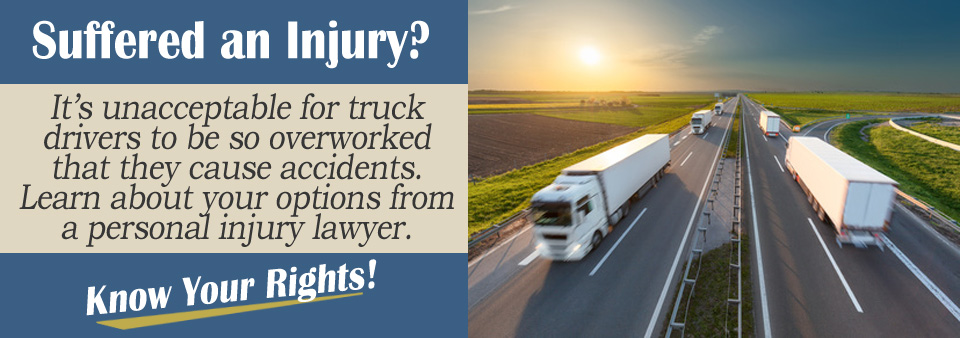If a trucking company forces its driver to work unreasonable hours and the driver causes an accident as a result, is the individual driver responsible or is the company responsible?
Trucks are all over the road, and the trucking industry has become one of the largest industries in the country as a result. Truck drivers work long hours, travel thousands of miles a week and often work more hours than the normal work week.
The high stress and long hours can lead to some devastating consequences. What happens if an overworked driver causes an accident? Is the driver responsible, or is it the company? We have asked attorney, Alaina Sullivan, about what you should do. Here is what she had to say:
Trucking Regulations
The trucking industry is highly regulated, both by federal laws as well as state laws. Trucking companies must follow set standards regarding their drivers, freight and trucks. The reason for these regulations is the high number of trucks you see on our nation’s interstates on a daily basis.
The trucking industry keeps our other industries going, but there can be severe consequences that can result should something go wrong. Accidents involving trucks could result in horrific property damage but more importantly, fatalities and debilitating injuries.
Vicarious Liability
The theory of vicarious liability involves the employer-employee relationship. If an employee is acting within his or her scope of employment and an accident occurs as a result of the employee completing his or her duties, the employer can be found to be vicariously liable for damages caused.
Nine times out of ten, this route is the one an injured plaintiff will want to take anyway. The odds of receiving payment through a large corporation are much higher than the odds of a plaintiff receiving compensation through an individual driver.
Duties and Standards of the Trucking Company
If the driver is an employee of the trucking company and not an independent contractor, this vicarious liability standard is even stronger. Trucking companies are required to ensure certain rules are followed.
The first of these is to ensure their drivers are alert and following all laws and standards. The driver’s license needs to be proper and legal. In addition, the driver must be alert and rested. If not, the risk of an accident dramatically increases.
This is why many states give maximum mileage and hours a driver can work. If a driver exceeds those amounts and it is found that the company is the reason for this, the company can and will be held liable, especially if that company is willfully violating that law.

Proving Negligence
To prove this vicarious liability, a plaintiff will need to show that the trucking company broke the law through negligence per se. This can be proven in many ways.
If a trucking company knows of the standards and laws under which their industry is regulated, and if the company knows one of those laws involves a maximum number of hours for drivers per shift, that company is being negligent by deliberately telling their employees to work over that set number of hours given by law.
Damages Included
If the trucking company is found to be vicariously liable, an injured plaintiff can seek damages, including property damages, medical damages, lost wages and earning capacity, and pain and suffering. You could seek these damages from the individual plaintiff, but seeking the damages from the actual company may be more productive.
Contact an Attorney Today
If you have been involved in a car accident with a truck and believe the company may be responsible, you should contact an attorney today to discuss your case. A licensed personal injury attorney will be able to evaluate your case and determine if you have a claim against the other party’s insurance company.
To receive the compensation for your medical bills, property damages, and pain and suffering, you should speak with a personal injury attorney in your area today.